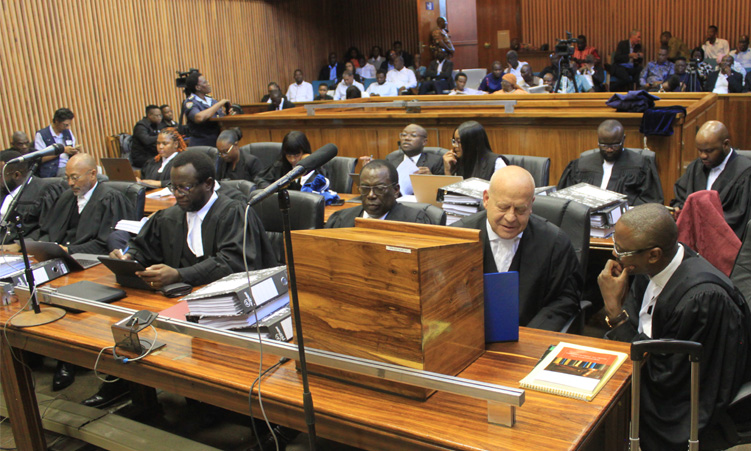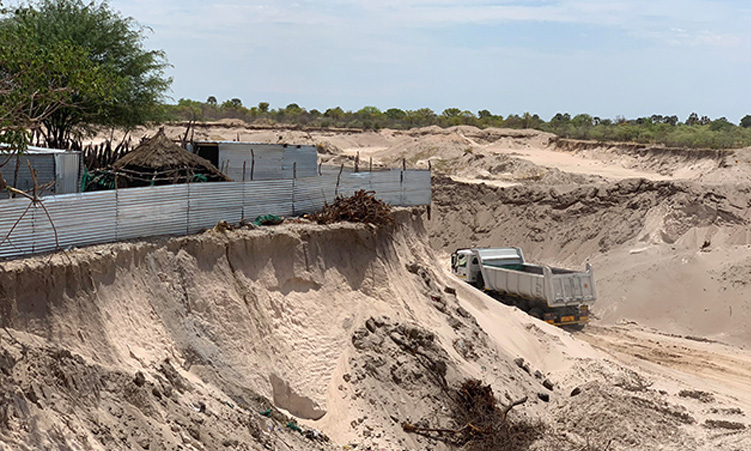GENEVA – High-stakes brinkmanship took hold on day three of crucial WTO trade talks yesterday, with both advanced and developing countries demanding concessions to avert another failure.
There were hopes that the late arrival of Indian Commerce Minister Kamal Nath, a leading emerging country representative, would spur progress but he appeared in little mood to give ground. “This is a round where developed countries have to put something on the table,” he told reporters, adding that “real” cuts in farm subsidies and tariffs were needed from rich countries rather than empty proposals.The European Union and the US have both made opening gambits with offers to reduce trade-distorting assistance to their farmers and are now calling for steps by developing nations to open their markets for industrial products.The World Trade Organisation has convened a meeting of about 30 leading trade negotiators this week with the aim of mapping out a deal to conclude the long-delayed Doha round of global trade talks.The Doha round began seven years ago with the aim of helping poor countries, but it has been delayed by disputes between developed and developing nations over subsidies and tariffs for farm and industrial products.The brinkmanship fits a pattern that has seen several previous meetings since 2001 collapse without a deal.”Progress has been modest until now,” WTO Director-General Pascal Lamy conceded in comments to the organisation’s 153 members, his spokesman Keith Rockwell said yesterday.But Rockwell suggested there had been an “intensification” of talks during and since a ministerial meeting late on Tuesday.In London, British Prime Minister Gordon Brown warned that the talks were at “the 11th hour” and “a critical moment.””If we do not succeed in the next few days, then it is very difficult to imagine people returning quickly to the negotiating table to secure the outcome that is needed,” he said.The United States on Tuesday offered to cut official aid to its farmers to 15 billion dollars a year, two billion dollars more than a previous offer, in a bid to spur movement at the WTO talks but found no support from key player Brazil.The US overture came after an attempt by EU Trade Commissioner Peter Mandelson to jolt the talks into movement on Monday with an announcement that the European Union was now ready to extend tariff cuts on agricultural products to 60 per cent from 54 per cent.Nath, who arrived late because of a confidence vote against the government in the Indian parliament on Tuesday, called the US offer “wholly inadequate” yesterday.The EU offer was described as “propaganda” by Brazil and even dismissed as nothing new by the EU farm commissioner Mariann Fischer-Boel.Among all the pessimism, Indonesia’s trade minister sounded a note of optimism, saying she had seen “coded signals” indicating that the key players were ready to make new offers to reach a final deal.”I have to be cautiously optimistic (about progress).There were coded signals – some evidence was there yesterday, even though they were not putting explicit offers on the table,” said Mari Elka Pangestu of a ministerial meeting Tuesday night.Pangestu, who speaks for the G33 group of developing countries, added that it was “not just the US or Europe”, but that “it’s what we call the major countries.”Nath insisted yesterday however that he would be prepared to let a global trade deal go if developed nations insisted on including in an accord measures that would compromise India’s industries.Developed nations are pushing for a so-called anti-concentration clause – which stops countries from exempting certain sensitive sectors from tariff cuts, to be included in a final global trade deal.”All developing countries must protect their infant industry, must protect their small industry, and if it is a deal breaker so be it,” he said.Nampa-AFP”This is a round where developed countries have to put something on the table,” he told reporters, adding that “real” cuts in farm subsidies and tariffs were needed from rich countries rather than empty proposals.The European Union and the US have both made opening gambits with offers to reduce trade-distorting assistance to their farmers and are now calling for steps by developing nations to open their markets for industrial products.The World Trade Organisation has convened a meeting of about 30 leading trade negotiators this week with the aim of mapping out a deal to conclude the long-delayed Doha round of global trade talks.The Doha round began seven years ago with the aim of helping poor countries, but it has been delayed by disputes between developed and developing nations over subsidies and tariffs for farm and industrial products.The brinkmanship fits a pattern that has seen several previous meetings since 2001 collapse without a deal.”Progress has been modest until now,” WTO Director-General Pascal Lamy conceded in comments to the organisation’s 153 members, his spokesman Keith Rockwell said yesterday.But Rockwell suggested there had been an “intensification” of talks during and since a ministerial meeting late on Tuesday.In London, British Prime Minister Gordon Brown warned that the talks were at “the 11th hour” and “a critical moment.””If we do not succeed in the next few days, then it is very difficult to imagine people returning quickly to the negotiating table to secure the outcome that is needed,” he said.The United States on Tuesday offered to cut official aid to its farmers to 15 billion dollars a year, two billion dollars more than a previous offer, in a bid to spur movement at the WTO talks but found no support from key player Brazil.The US overture came after an attempt by EU Trade Commissioner Peter Mandelson to jolt the talks into movement on Monday with an announcement that the European Union was now ready to extend tariff cuts on agricultural products to 60 per cent from 54 per cent.Nath, who arrived late because of a confidence vote against the government in the Indian parliament on Tuesday, called the US offer “wholly inadequate” yesterday.The EU offer was described as “propaganda” by Brazil and even dismissed as nothing new by the EU farm commissioner Mariann Fischer-Boel.Among all the pessimism, Indonesia’s trade minister sounded a note of optimism, saying she had seen “coded signals” indicating that the key players were ready to make new offers to reach a final deal.”I have to be cautiously optimistic (about progress).There were coded signals – some evidence was there yesterday, even though they were not putting explicit offers on the table,” said Mari Elka Pangestu of a ministerial meeting Tuesday night.Pangestu, who speaks for the G33 group of developing countries, added that it was “not just the US or Europe”, but that “it’s what we call the major countries.”Nath insisted yesterday however that he would be prepared to let a global trade deal go if developed nations insisted on including in an accord measures that would compromise India’s industries.Developed nations are pushing for a so-called anti-concentration clause – which stops countries from exempting certain sensitive sectors from tariff cuts, to be included in a final global trade deal.”All developing countries must protect their infant industry, must protect their small industry, and if it is a deal breaker so be it,” he said.Nampa-AFP
Stay informed with The Namibian – your source for credible journalism. Get in-depth reporting and opinions for
only N$85 a month. Invest in journalism, invest in democracy –
Subscribe Now!









